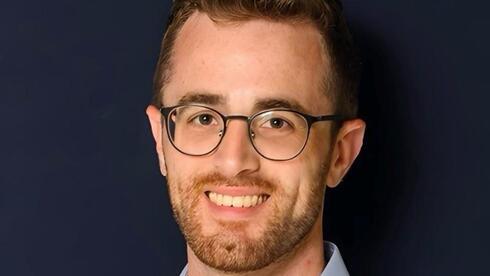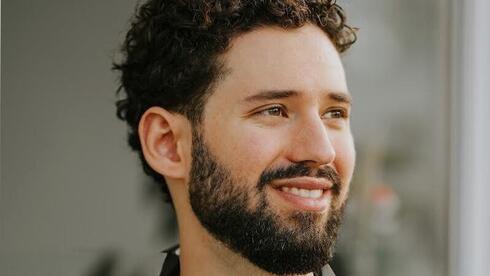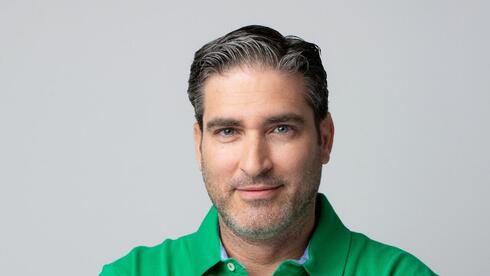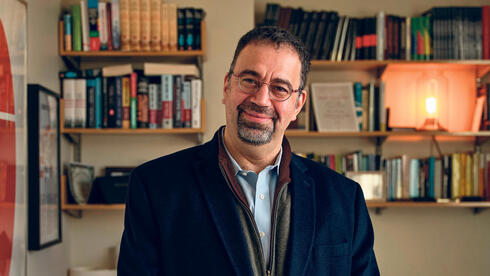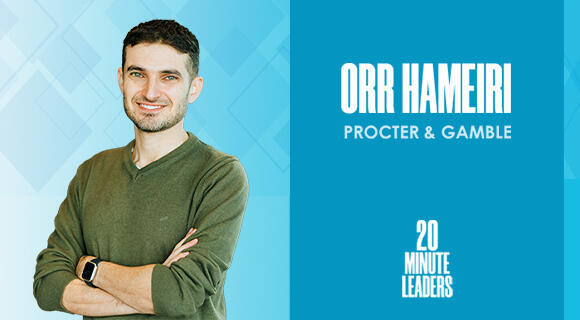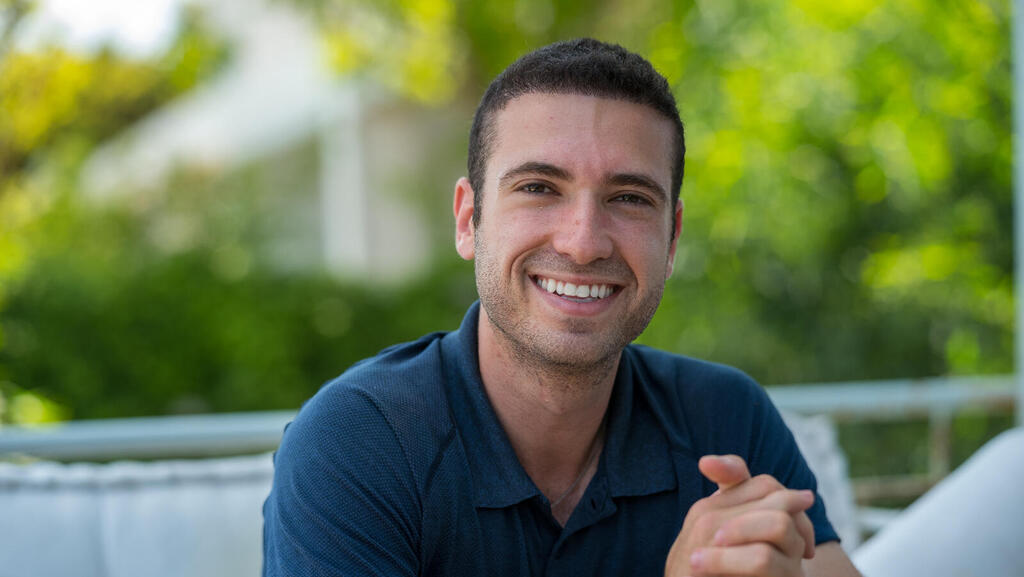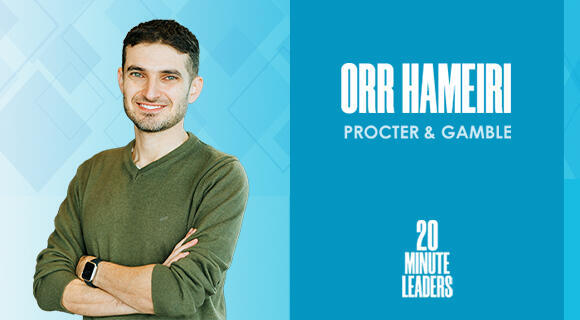
20-Minute Leaders
"We pre-vet P&G business units' readiness to collaborate with startups"
By leading innovation in a company that reaches five billion users a day, global tech innovation director at Procter & Gamble, Orr Hameiri says he has the chance to impact many lives worldwide.
By leading innovation in a company that reaches five billion users a day, Orr Hameiri says he has the chance to impact many lives worldwide. He is the global tech innovation director at Procter & Gamble, which he says is a great job for him because he is infinitely curious and ready to learn. Hameiri explains that he gets to meet with founders from a wide variety of fields and connect them to P&G’s global business units. The aim is to become clients of these startups and create win-win situations for everyone. Hameiri shares that he measures his success by helping the business units reach their goals and how many ideas scale and make an impact. He says that there are many bright minds within P&G, but they also realize they can’t invent everything or some things would take too long, so leaders are very open to outside inventions.
Orr, how do you describe yourself?
I describe myself as an infinitely curious learner. I'm not a technologist by background. I'm actually an accountant, unfortunately. I joined P&G as the local comptroller in charge of the accounting, the tax, the payroll.
After a couple of years, I realized that my real true passion lies with innovation. I started my executive MBA with concentration on venture capital. I met with the CEO of P&G Israel and the CFO. I said, “I just don't see my future as the next CFO. It's not what I care about.” This was five and a half years ago. I told them that my true passion lies with innovation, and I would like to take the responsibility to lead P&G's innovation activities within Israel.
What does innovation mean?
At least in my role, it's tech innovation. It is how to work with startups, open innovation, and how to incorporate their disruptive ideas within Procter & Gamble.
What led you to this internal conviction of saying, "I want to stop this trajectory and create a new one"?
P&G Israel had an innovation activity. That, together with my experience in the MBA, allowed me to basically get exposed to those activities. I realized that this is really what I want to do. There is so much talent here and so many great startups here that it would be a shame not to leverage their capabilities.
Why do it within P&G?
First of all, P&G is amazing. I think it's not often that you have a chance to impact the lives of so many people. At P&G, we're a combination of 350 unicorns put together. We have five billion daily active users.
How does innovation even take place?
There are so many different possibilities. First of all, implementing AI within P&G. AI is embedded in each and every aspect of what we do.
My role is basically to scout and assess startups all over the world and connect them to our global business units, and then make sure the solution is also scaled. We work with all the different business units of P&G. Whenever they have a challenge, they say, "We need your help." At that stage, we say, "Happy to help. But only if you answer three prerequisites." The first one is VP approval. That allows us to make sure that the business unit looks at this challenge as a must-have versus a nice-to-have.
The second is a budget for the POC. Between us, the innovation arm has that budget. But we want the business unit to pay for the POC because we want them to have skin in the game.
How many people does P&G have now?
100,000.
What's the third piece?
The third piece is human resource. We realize that the most important asset that entrepreneurs have is their time. We will not accept a situation where the entrepreneur needs to chase the corporate guy to answer her emails once every three weeks. We want to make sure that the business unit allocates someone from their team to be the project owner. It needs to be one of their annual goals, meaning this would impact their yearly bonus.
You are creating this structure where you have both skin in the game, you know that you have the potential for resources. You have the means of measuring a person's success. That increases the likelihood of success.
Definitely. Because the biggest challenge for many corporates is the so-called middle management. They cannot be blamed. These are people who are experts in their field. They have been doing a specific process for many years, and it works. This is why we've created this personal incentive.
Tell me about the things that you've done within P&G that really stand out for you.
Most of the job that we are doing is partnerships. We are looking to partner with startups to become their clients. We want to basically implement their technology at a very relatively early-stage. Unfortunately, I cannot name some of the success stories that we have. What I can mention is two instances of startups that we've invested in in the last year. The first is Grin, which is in the tele-dentistry space. The second is Moodify, which is in the scent digitization space.
When you are looking at an investment in comparison to a partnership, what is the difference?
First of all, it's not “instead.” We will invest only if there is an opportunity or possibility to also partner. Those investments are only strategic investments.
Is this investment mostly for the ability to make a larger impact within the company decision-making, for exclusivity, or potential M&A later on?
All of the above, and maybe one more, which is basically to gain exposure and to bring another angle of innovation for P&G. We know that we won't be able to invent everything ourselves. There is a lot of openness for things that are being invented outside.
What do you do in the day-to-day?
I have the best job in the world. Basically, half of my role is externally facing, meeting the most interesting startups in a wide variety of spaces. I'm looking from data analytics startups, cyber, enterprise infrastructure, FemTech, wellness, sustainability, supply chain.
So you meet a company like that. How do you bring that to an investment?
The other half of the role is internally facing. That's first and foremost understanding what are the challenges of the business units. You need to be very much involved with the business. I think a very important aspect of it is creating credibility. You do that by quick wins and the small things. Step by step, you are creating that trust within the teams.
I want to go back to the three prerequisites. I was bluffing a bit. So it's not only three prerequisites. Basically, once those three prerequisites are met, we then meet with a business unit and we brainstorm with them. I then go back to the VP and I tell her, “Actually, there are two more.” One is to define what success looks like.
In other words, KPIs. I want to avoid a situation where the business unit has defined or tasked the startup with providing 10X of something. They provided 10X. Then I'll go back to the business unit to say, "Can we scale?" Then they'll tell me, "Let us think about it. Maybe next year." If the startup delivered 10X, we continue to scale. I don't care about POCs. What I care about is successful POCs that have scaled within the company and have created an impact.
The second is basically budget for the sake of scaling. We have no idea how much budget will be needed for the sake of scaling. But what I do want to hear from her is, "Yes, Orr. If we find the right startup and the pilot is successful, I have sufficient budget for the sake of scaling." If it's a must-have, they'll have the budget.
It sounds more conceptual than tangible, but it still gives you that understanding that it's possible and there is willingness.
What we are doing here is pre-vetting our corporate for the startups. In the end, it creates a win-win for everyone because we didn't waste the time of the business unit, the startups, or us.
You actually measure yourself by your ability to meet what the business units have articulated as their KPI.
Right. The question of how innovation managers at corporates are being measured is probably one of the most challenging questions in the open innovation space. If I decided to be measured on POCs, I could create 100 POCs each year, but nothing would happen for P&G and I would waste the time for all the startups.
Do startups understand the amount of work and process that you've made towards that?
They definitely do. They cherish that. Our success rates are pretty high. I think one of the reasons the top VCs in the world love to work with P&G is because of that value we create for them and for their portfolio companies.
Why is this the best job in the world for you?
I have a job where I'm actually getting paid to see and meet with the most interesting people worldwide. No day looks like the other. It's very, very different and very inspirational each and every day.
Michael Matias, Forbes 30 Under 30, is a Venture Fellow at Innovation Endeavors as well as investment Venture Partner at Secret Chord and J-Ventures. He studies Artificial Intelligence and Human-Computer Interaction at Stanford University, and was an engineer at Hippo Insurance. Matias previously served as an officer in the 8200 unit. 20MinuteLeaders is a tech entrepreneurship interview series featuring one-on-one interviews with fascinating founders, innovators and thought leaders sharing their journeys and experiences.
Contributing editors: Michael Matias, Megan Ryan



